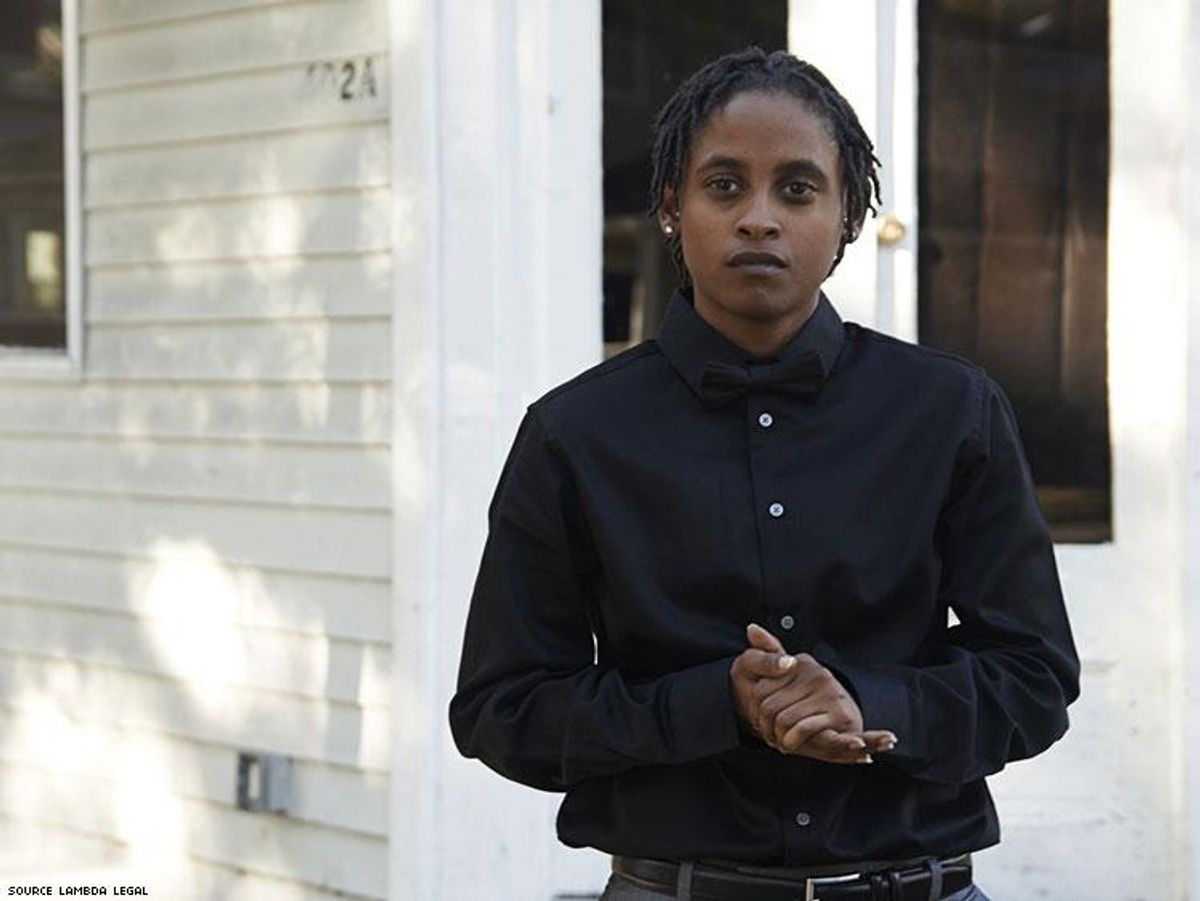An appeals court has dealt a setback for efforts to expand the scope of federal civil rights law, saying it doesn't cover discrimination based on sexual orientation.
The U.S. Court of Appeals for the Eleventh Circuit ruled Friday in the case of Jameka Evans, who said she suffered harassment and discrimination at her job as a security guard at Georgia Regional Hospital in Savannah, and was eventually forced out, because she's a lesbian and gender-nonconforming, the Associated Press reports. A federal district court had dismissed her suit, and a three-judge panel of the Eleventh Circuit upheld the dismissal. Lambda Legal, which is representing Evans, plans to ask for a rehearing by the full court.
In a 2-1 decision, the panel said it accepted the facts of her case as true, but said it was bound by precedent that Title VII of the Civil Rights Act of 1964, which prohibits sex discrimination, does not cover discrimination based on sexual orientation. The U.S. Equal Employment Opportunity Commission holds that it does, in addition to covering discrimination based on gender identity, but courts are still free to interpret the law. If the Eleventh Circuit had ruled in Evans's favor, it would have been the first time a federal appeals court had upheld that interpretation of the law.
Judge Jose Martinez, writing for the majority, said the court was bound by a 1979 decision, Blum v. Gulf Oil, "that has not been overruled by a clearly contrary opinion of the Supreme Court or of this Court sitting en banc." He also said, though, that Evans could amend her suit to make a case that she was discriminated against due to gender stereotyping, given her masculine gender presentation. In the current suit, "she did not provide enough factual matter to plausibly suggest that her decision to present herself in a masculine manner led to the alleged adverse employment actions," Martinez wrote.
Lambda Legal's Greg Nevins, however, said being gay, lesbian, or bisexual is gender-nonconforming on its face. "There is no way to draw a line between sexual orientation discrimination and discrimination based on gender nonconformity because not being straight is gender-nonconforming, period," Nevins, the group's employment project director, said in a blog post.
Joining Martinez in the decision was Judge William H. Pryor, who had been on Donald Trump's list of potential Supreme Court nominees. "Just as a woman cannot recover under Title VII when she is fired because of her heterosexuality, neither can a gay woman sue for discrimination based on her sexual orientation," Pryor wrote in a concurring opinion. "Deviation from a particular gender stereotype may correlate disproportionately with a particular sexual orientation, and plaintiffs who allege discrimination on the basis of gender nonconformity will often also have experienced discrimination because of sexual orientation. But under Title VII, we ask only whether the individual experienced discrimination for deviating from a gender stereotype."
Pryor is not known for LGBT-friendliness. In the case of Lawrence v. Texas, which led to the Supreme Court striking down sodomy laws nationwide, he had written a friend-of-the-court brief supporting sodomy laws, and he has derided LGBT rights as "political correctness." But in 2011, in the case of Georgia state employee Vandy Beth Glenn, he ruled that her termination for being transgender did violate federal law. But Evans's case is different, Pryor said, because it was based on status rather than behavior (in Glenn's case, the "behavior" was transitioning and making it known to her boss).
"A gay individual may establish with enough factual evidence that she experienced sex discrimination because her behavior deviated from a gender stereotype held by an employer, but our review of that claim would rest on behavior alone," he wrote. Not all gay people, he said, engage in the same behaviors.
The dissenting judge, Robin Rosenbaum, took a position similar to Lambda Legal's. "Plain and simple, when a woman alleges, as Evans has, that she has been discriminated against because she is a lesbian, she necessarily alleges that she has been discriminated against because she failed to conform to the employer's image of what women should be -- specifically, that women should be sexually attracted to men only," Rosenbaum wrote.
In any case, "this is not the end of the road" for Evans, Nevins said. "Ninety percent of Americans believe that LGBT people should be treated equally in the workplace," he added. "The public is on the right side of history, and it's time for the Eleventh Circuit to join us."


















































































